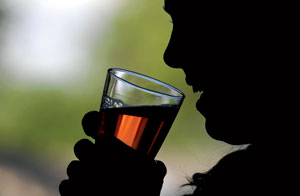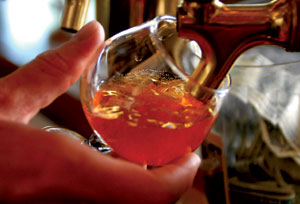A proposed change to the rules governing microbrewery taprooms has upset local and state brewers who say it’s the latest attempt to further regulate an industry already handcuffed by state law.
State law allows breweries to sell or give away 48 ounces of beer per person, per day, between the hours of 10 a.m. and 8 p.m. Taps must be shut off by 8 p.m., but many breweries allow customers to stay longer to finish their last drink.
The state’s Department of Revenue, though, is proposing an administrative rule change that would make it illegal for customers to consume or possess a microbrew in a taproom after 8 p.m.
Local brewers say the change will cut into the retail sales they rely on to supplement wholesale beer sales during a time when profit margins are already narrowing due to the rising price of hops, barley and gas.
“This feels like yet one more restriction placed on Montana breweries that makes it harder for us to do business,” Dave Ayers, brewer and owner of Glacier Brewing Company in Polson, said. “Bottom line, this proposed ruling, it just smacks of some sort of lobbyist attempt to shut down competition.”
About 200 people signed a petition posted in Glacier’s taproom opposing the new rule in just the first day it was out, Ayer said.
 |
|
Whitefish resident Katherine Abram takes a sip of the Going to the Sun IPA at the Great Northern Brewing Company tap room in Whitefish. |
But Shauna Helfert, administrator of the Department of Revenue’s Liquor Control Division, said the proposed rule is the result of several telephone complaints over the past two years from the public, law enforcement officials and even other brewers that taste room patrons were staying and drinking past 8 p.m.
The new rule would bring consistency to the industry and clarify existing law, she said, adding that the precedent is similar to bars and taverns where the state mandates that patrons can’t have alcoholic beverages in their possession after 2 a.m.
“It’s hard to enforce the law as is, because when law enforcement enter a tap room and someone is drinking a beer after 8 p.m. they don’t know if that beer was served legally before the cutoff or after,” she said. “The idea is to have all the breweries consistently abiding by state law.”
Local brewers argued that if the department wants consistency it should also restrict cabaret licenses, which allow patrons to consume wine and beer after the 11 p.m. serving cutoff.
“That hadn’t even crossed our purview because we hadn’t received any complaints about those businesses – in part, I think because a lot of them close before 11 p.m.,” Helfert said. “Several people have brought it up though since this proposal and it’s a good point.”
Helfert encouraged people to attend the department’s public hearing on the rule change at 1:30 p.m. on Aug. 7 in Helena or to submit written comment by Aug. 15.
 |
|
Matthew Bussard pours a taste of Wheatfish, a wheat logger, for a customer at the Great Northern Brewing Company tap room. |
At its root, the current controversy stems from historic tensions over the state’s brewery laws. Prior to 1999, breweries could give away beer samples but not sell them. When brewers asked the state Legislature for permission to sell beer on site, the Montana Taverns Association – a powerful state lobbying group – opposed it, and a legislative battle ensued. The current laws were the resulting compromise.
When the brewers association supported a bill in 2005 to change state law to eliminate the 48-ounce rule and extend taproom serving hours to midnight, the MTA fought the effort and the bill died in committee.
“Obviously, we’d like normal bar hours, because the retail sales are critical for us,” Sam Hoffmann, president of the Montana State Brewers Association and owner of Red Lodge Ales, said. “There’s not many people buying beer in those morning hours, so realistically we have about three hours from about 5 p.m. to 8 p.m. to sell beer. This is going to cut into that limited, and valuable time, even further.”
At Glacier Brewing Company, Ayers estimates that since a recent expansion, taproom sales now make up more than half of his business. In Whitefish, Joe Barberis, head brewer at Great Northern Brewing Company, put the figure around 30 percent. “It’s extremely important to us, especially to get through the slower seasons,” he said.
When Tamarack Brewing Company opened last year in Lakeside, the owners had to set up two entirely separate businesses – a brewery and a restaurant with its own liquor license – to be able to run the grill and alehouse.
“When I lived in Arizona, it was a brew pub culture and they welcomed and supported the pubs and the pubs were great tax revenues for the state and city and a popular place for customers,” Craig Koontz, Tamarack’s brewer and co-owner, said. “Montana seems way behind the game. I don’t understand why you’d restrict more business and growth in the state.”
Related: Revenue Department Pulls Proposed Rule Restricting Taproom Hours